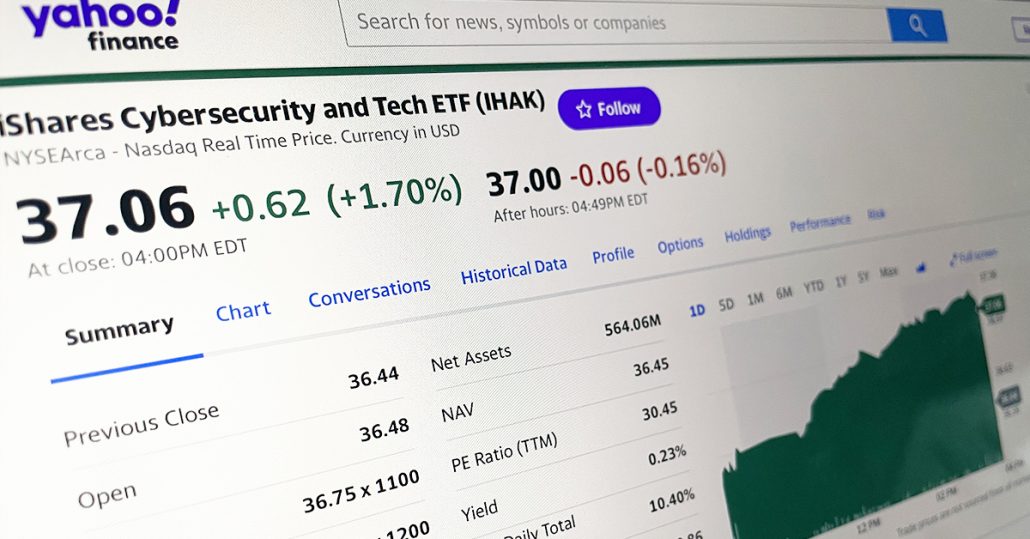
With the ever-increasing frequency and complexity of cyber threats, investing in the cybersecurity sector has become a popular choice for investors looking to capitalize on the growing demand for robust digital defense solutions. One efficient way to gain exposure to this sector is through cybersecurity exchange-traded funds (ETFs). In this article, we will explore cybersecurity ETFs and highlight some notable funds and their respective ticker symbols.
- First Trust NASDAQ CEA Cybersecurity ETF (NASDAQ: CIBR): CIBR is one of the pioneering cybersecurity ETFs, tracking the Nasdaq CTA Cybersecurity Index. The fund provides investors with exposure to companies engaged in the cybersecurity industry, including network security, data protection, and threat intelligence providers. CIBR’s diversified portfolio includes established cybersecurity firms, making it an attractive option for investors seeking broad exposure to the sector.
- Objective: Tracks the Nasdaq CTA Cybersecurity Index, providing exposure to companies in the cybersecurity industry.
- Holdings: Offers a diversified portfolio of global cybersecurity companies, including established players and emerging firms.
- Expense Ratio: 0.60%
- ETFMG Prime Cyber Security ETF (NYSE Arca: HACK): HACK is another prominent cybersecurity ETF that seeks to track the Prime Cyber Defense Index. This ETF invests in companies involved in various aspects of cybersecurity, including software, hardware, and consulting services. HACK offers exposure to both established players and emerging companies, making it an appealing choice for investors looking for growth potential in the sector.
- Objective: Seeks to track the Prime Cyber Defense Index, providing exposure to companies involved in cybersecurity.
- Holdings: Invests in firms across the cybersecurity industry, including software, hardware, and consulting services.
- Expense Ratio: 0.60%
- Global X Cybersecurity ETF (NASDAQ: BUG): BUG is designed to track the Indxx Cybersecurity Index, providing investors with exposure to companies involved in cybersecurity operations and services. This ETF focuses on firms across different market capitalizations and geographical regions. With its global perspective, BUG offers diversification and potential opportunities in both developed and emerging markets.
- Objective: Aims to track the Indxx Cybersecurity Index, providing exposure to global cybersecurity companies.
- Holdings: Diversified portfolio of companies engaged in cybersecurity operations and services.
- Expense Ratio: 0.50%
- iShares Cybersecurity and Tech ETF (NYSE Arca: IHAK): IHAK aims to track the NYSE FactSet Global Cyber Security Index, which includes companies involved in the cybersecurity industry as well as those engaged in emerging technology themes. This ETF provides investors with exposure to both cybersecurity firms and innovative technology companies that contribute to the cybersecurity ecosystem.
- Objective: Tracks the NYSE FactSet Global Cyber Security Index, including companies involved in cybersecurity and related technology themes.
- Holdings: Offers exposure to both cybersecurity firms and innovative technology companies contributing to the cybersecurity ecosystem.
- Expense Ratio: 0.47%
- Invesco Dynamic Software ETF (NYSE Arca: PSJ): While not solely focused on cybersecurity, PSJ is an ETF that invests in software companies, including cybersecurity firms. It tracks the Dynamic Software Intellidex Index, which includes companies involved in various software-related activities. This ETF offers exposure to both established software providers and emerging players in the cybersecurity space.
- Objective: Track the performance of the Dynamic Software Intellidex Index.
- Holdings: Firms involved in software development, software-as-a-service (SaaS), infrastructure software, and other software-related activities.
- Expense Ratio: 0.58%.
Investing in cybersecurity ETFs can be an effective way to gain exposure to the growing cybersecurity sector without having to select individual stocks. Funds like CIBR, HACK, BUG, IHAK, and PSJ provide investors with diversified portfolios of cybersecurity companies, ranging from established industry leaders to emerging players. As the threat landscape evolves and the need for robust cybersecurity solutions continues to increase, these ETFs offer potential opportunities for investors looking to capitalize on the growth potential of the cybersecurity industry. Before investing, it is essential to conduct thorough research, consider one’s investment goals and risk tolerance, and consult with a financial advisor to ensure the chosen ETF aligns with one’s investment strategy.



